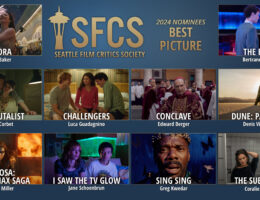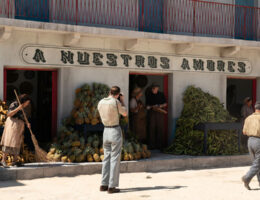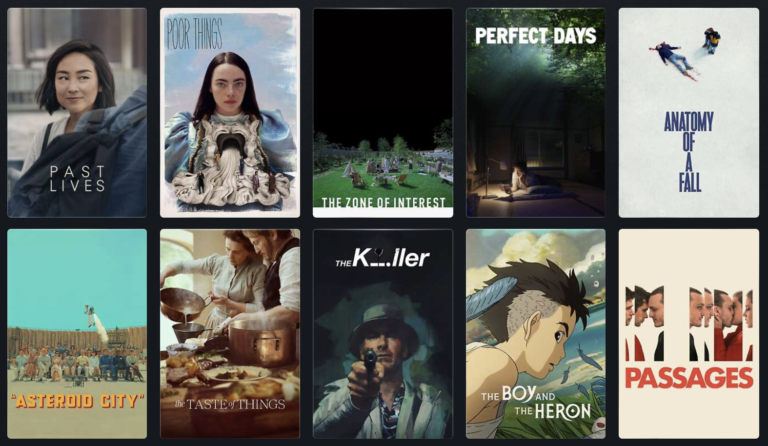Sometimes you struggle to find enough movies to put on a year-end list, other years it’s a knife fight in the mud to narrow the list to ten. Whether it was post-pandemic supply lines opening to finally push premium product into festival programming and theatrical release or some other burst of creativity in the industry, even making a top twenty-five list would’ve left some great films out.
But in the spirit of tradition, I anguished to narrow the list to ten (and failed). Here’s my list as it stands now, complete with ties, special mentions, from a yea of theatrical releases and deep dives that brought a bounty of riches to the screen.
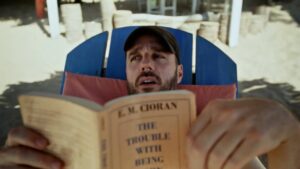
10*. Rotting in the Sun (Sebastián Silva)
Sundance is always a crapshoot of hit-and-miss big-swing indie films, but sometimes you land on a low budget comedy that sticks with you all year. On an exceptionally horny Zicatela beach, Sebastián Silva meets manic influencer and fan Jordan Firstman (both playing heightened versions of themselves based on a real life event). They make plans to collaborate on a new project, but when Silva disappears from his own narrative Firstman and Catalina Saavedra (as a perpetually beleaguered housekeeper who’d get a Supporting Actress nomination if there was any justice in the world) collide with a series of escalating misunderstandings and cover-ups. Hilarious, suspenseful, and made for under a million dollars, Silva’s self-scathing autofiction hall of mirrors is a deeply insider commentary on gay culture and the follies of social media. It’s some kind of dark irony that it didn’t get nearly the attention it deserved. Maybe it was all the dicks?
Rotting in the Sun is available to stream on Mubi.

10*. Passages (Ira Sachs)
Speaking of gay choos monsters, it’s not quite right to call what happens in Passages a “love triangle”. As a film director who’s just wrapped a big project, an incredible Franz Rogowski upends his longtime partnership (Ben Whishaw) by pursuing a spontaneous affair with the world’s most glamorous elementary teacher (Adèle Exarchopoulos). Sachs’s gift is appreciating that when there are no easy answers, it’s all the more thrilling to watch compelling performers wrestle with the questions of satisfying desire, navigating jealousy, and making choices between self-preservation and emotional fulfillment. Rogowski’s fearless in embodying this ego-maniac as he ricochets between partners in waves of desperate, demanding, indecisive stunts. He’s an insufferable character who learns nothing, but his charisma is such that you can’t look away from his child-like sense of discovery, insatiable hunger for novelty, and self-serving ability to ignore his destructive effect on others.
Passages is available to stream on Mubi.
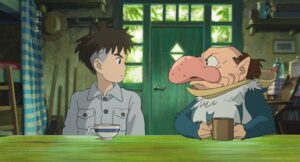
9 The Boy and the Heron (Hayao Miyazaki)
I don’t watch a ton of animation but there was no way I was missing the latest Hayao Miyazaki. Loosely autobiographical, the melancholic recollection finds a young kid in Japan during WWII confronting the tragedies of war, senseless death, loss of youth, and oh so many asshole birds. It’s the work of a supreme storyteller reflecting on his own life and contemplating a world beyond his own existence, Miyazaki’s possible swan song is a surreal, exquisitely animated journey about the responsibilities of being alive.
The Boy and the Heron is currently in theaters.

8. The Killer (David Fincher)
Notorious perfectionist David Fincher made one of the year’s most entertaining movies about a self-deceiving perfectionist hitman whose first mistake sets off a chain of of controlled chaos as his precious rules go out the window. Fittingly for a Netflix movie, Fincher structures Michael Fassbender’s globe-trotting revenge spree in a series of episodes that skewers the assassin genre, each with their own look, feel, and soundscape. Yet they’re all of a piece, a forever-forward march through a vengeance checklist, with nonstop internal monologue of mantras, biting commentary, and a soundtrack of the Smiths’s greatest hits. The constant patter, innovative camerawork, and immersive sound design embed us inside the unintentionally contradictory narrative in a professional’s head. As our silent killer advances determinedly, it’s funny and surprising, grisly and inventive, and a sleekly packaged reminder that no amount of preparation can save you from yourself.
The Killer is currently streaming on Netflix.

7. The Taste of Things (Tran Ahn Hung)
With respect to Frederick Wiseman’s exceptional four hour documentary Menus-Plaisirs — Les Troisgros and to Chad Stahelski’s “Sacre Coeur” stairway sequence, the year’s best action choreography and gourmet food photography were both in Tran Ann Hung’s sumptuous culinary turn of the century romance The Taste of Things. Benoît Magimel is the Napoleon of French cuisine. Juliette Binoche is his cook, apprentice, and lover. She cooks for him. He cooks for her. Theirs is a complicated love. That’s the whole movie. C’est magnifique!
The Taste of Things gets a theatrical release next year.
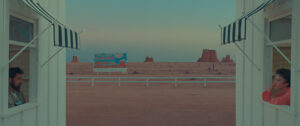
6. Asteroid City (Wes Anderson)
What a year for my guy Wes Anderson, who’s never made a bad movie. He made four prickly adaptations of Roald Dahl on Netflix (a welcome bitter counterbalance to Paul King’s delectable Wonka) and made one of the best feature films of the year. Asteroid City is peak Wes Anderson: an artfully curated series of nested jewel box dollhouses in the form of an imaginary drama created for, and taking place within, a fictional broadcast. Scientists, soldiers, broken parents, prodigy kids, cowboys, and even an alien find themselves congregated in a one stoplight tourist town in the American Southwest at the dawn of the Nuclear Age. The array of colorful characters are a delight, but they’re part of his most direct explanation for his reliance on precisely controlled aesthetics as a safe space for incredibly messy emotions. From frequent collaborator Jason Schwartzman to new-to-the-Wesverse Scarlett Johansson, the technically dextrous turns by some of our best actors are all knockouts that supercharge every multi-faceted scene with lingering power.
Asteroid City is available to to rent on VOD or to stream on Prime Video.
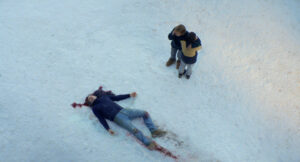
5. Anatomy of a Fall (Justine Triet )
A French documentary team made the riveting miniseries The Staircase, so it’s fitting that another French director takes a spin on the classic story of a bisexual writer accused of causing a mysterious fall-related death of a spouse. This time, it’s told through the perplexing lens of the French justice system. Far more than a prestige hour of Law and Order, this the Palme d’Or winner is an emotionally ravaging interrogation into the unknowable soul of a marriage that challenges the foolish notion of ever knowing an unshakeable bedrock truth. It’s a rare film to have both a heart-piercing youth performance (Milo Machado-Graner) and some of the finest Animal Acting committed to the screen. Although Messi the border collie’s tremendously pivotal as “Snoop”, it’s Sandra Hüller who’s electric in an all-timer of a domestic dispute at the film’s centerpiece.
Anatomy of a Fall is available to rent on various VOD platforms.

4. Perfect Days (Wim Wenders)
I love a movie that lets us watch an artist at work (see also, Showing Up) especially when it’s a craftsman of a job I’ve never considered. Every day Hirayama (Kōji Yakusho, quietly phenomenal), wakes up, folds his sleeping mat, gets ready for the day ahead, buys a coffee from the vending machine outside his flat, pops a cassette tape in his truck’s stereo, and drives around Tokyo to clean public toilets. At night, he gets dinner at his favorite ramen place, returns home, and reads a few chapters of a novel before falling asleep. The whole clockwork routine repeats every day. Going through a week in his life sounds boring, but Wenders finds a way to make it anything but. Tokyo’s public toilets are a marvel of public infrastructure, each with a novel design to integrated into its neighborhood, worthy of their own documentary. The care that he brings to his work makes even the most mundane seem fascinating. And within the repetitive structure of his days come small variations, opportunities to appreciate the natural world, and unexpected perturbations.
When it ends with one of the best direct-to-camera long-takes since Call Me By Your Name, we realize we’ve learned everything we need to know about this remarkable man with him having said barely anything at all.
Perfect Days will have a theatrical release early next year. It’s the Japanese entry for International Feature.
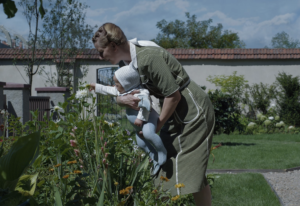
3. The Zone of Interest (Jonathan Glazer)
In the year’s most arresting, slowly overwhelming gut punches, Jonathan Glazer’s ‘s sterile, naturally lit, digital video bears witnesses to the indifferent complicity of a German family living their dream life while sharing a barbed wire fence with the concentration camp at Auschwitz. It’s there, in the midst of WWII, that Rudolf Höss (Christian Friedel) oversees the horrifically efficient murder of hundreds of thousands of Jews. In an utterly chilling performance, Sandra Hüller’s Hedwig enjoys the privileges of the comfortable home, stolen furs, and well-stocked pantry that come by way of her husband’s vile work. The family scarcely take notice; so we experience the camps as they do: never directly witnessed, with sounds of gunshots, the sight of arriving trains, and the horrible smells of fires at night barely raising their notice. The ease of their ignorance is atrocious.
The sneakiest and smartest thing Glazer does in this unmooring clinical dissection of a bourgeoise lifestyle enabled by administrative evil is to situate it among people whose complicity is unquestioning and absolute. It creates a paradoxically palatable distance for the audience to pass judgment. Only later, as the film’s lens widens, do we come to appreciate the sickening scale of how many stood by then (and, honestly, still do) while atrocities occur in the greater distance to preserve comfort at the expense of unseen horrors. It’s a profound piece of filmmaking: urgent, essential, and unshakeable.
The Zone of Interest gets a theatrical release, opening in Seattle on January 19.

2. Past Lives (Celine Song)
Despite having seen it nearly a year ago at Sundance, Celine Song’s shimmering romance Past Lives spent the year near the top of my list. An exquisitely constructed, personally-inspired story grabs your attention from the mystery of its opening scene and never lets go. The decade-spanning story follows powerhouse trio Greta Lee (vibrant and searching), Teo Yoo (staid uncertain longing) and John Magaro (exceptionally understated) across decades of pre-teen anxieties, the seemingly miraculous continent-spanning connections empowered by the dawn of social networking, and the seismic effects of unexpected adult reunions. After setting up delicate yearning and bringing us from South Korea to Canada to New York, the film culminates on a Brooklyn street corner in the year’s most gracefully striking endings.
Past Lives is available on various VOD platforms

1. Poor Things (Yorgos Lanthimos)
Any of these top four could’ve been in the number one spot, but for the sake of novelty I’m ending with Yorgos Lanthimos’s inventive take on the Frankenstein myth, in which a sexually-insatiable experiment stumbles from a Goldbergian laboratory out into a vibrant Ozlike world. I adored its laugh-out-loud moments of physical comedy, clever constructions of language, nonstop visual delights, and a truly outrageous and kaleidoscopic array of sexual awakenings, Poor Things is easily Lanthimos’s warmest-hearted and most accessible film. Surrounded by a stellar cast — Willem Dafoe as her physically and emotionally scarred “father”, Mark Ruffalo as a riotous louche of a lover — it’s Emma Stone’s triumph. Hers is a tremendous and daring feat of physicality and emotion whose portrayal of the discovery of the pleasures and pains of humanity is never short of utterly rapturous.
Poor Things is currently playing in theaters.
Special Mention: Barbenheimer
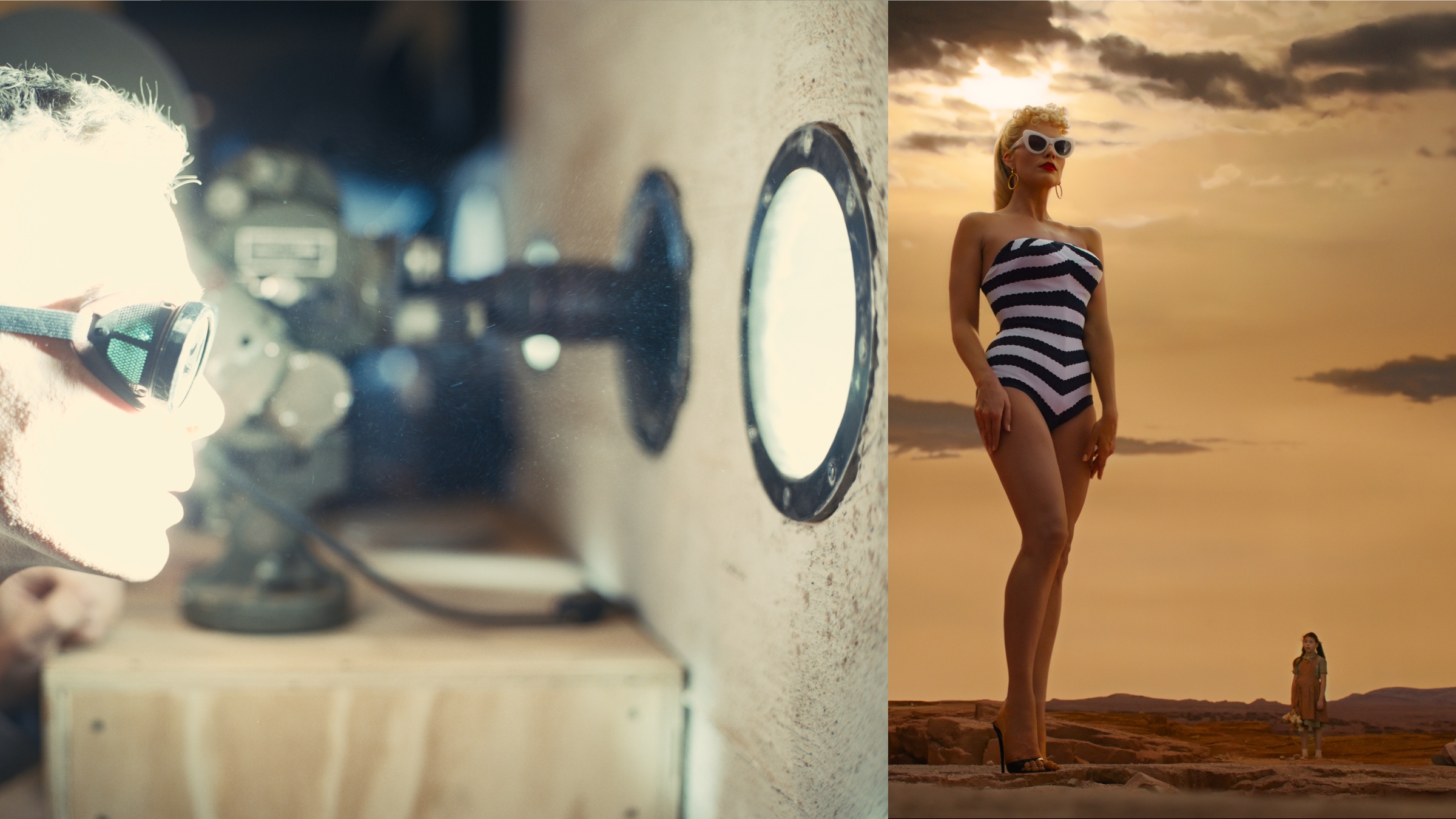
Barbie (Greta Gerwig) and Oppenheimer (Christopher Nolan)
Aside from being about creations from the middle of the 20th century whose implications continue to echo into the present day, Barbie and Oppie have very little to do with each other. But for one glorious summer weekend, Greta Gerwig’s pop-infused feminist musical masterpiece and Christopher Nolan’s grandiose examination of the birth of the atomic bomb became forever intertwined as unintentional force multipliers that reinvigorated the practice of hordes of fans descending upon movie theaters en masse to experience a phenomenon together. All these months later, Ludwig Göransson’s wailing score and “I’m Just Ken” remain spookily entangled in my mind.
(Barbie is currently streaming on Max; Oppenheimer is rentable on VOD but the real ones already pre-ordered the 4K BluRay.)
Other Honorable Mentions:
It was a bit of a slow year for documentaries, but the top of my list includes Frederick Wiseman’s Menus-Plaisirs — Les Troisgrois, tremendous portrait of a family restaurant at the peak of culinary success and a generational crossroads. Matthew Heineman’s American Symphony grants an incredibly personal look inside John Batiste’s life as he collaborates to compose the titular piece amidst the pandemic and his wife’s relapse with leukemia; it’s a privileged glimpse at creativity, caregiving, and a strident reminder of the why humans make music. I was entranced by Errol Morris’s The Pigeon Tunnel, which captures a series of conversations with John le Carré (or rather, David Cornwell) in which two master storytellers spin yarns about family and fiction; by the end you’ve heard a good story without knowing how much of it is true.
A ton of movies were just outside my list. It was a great year for smaller movies about the big feelings involved in carving out a life of creativity with Kelly Reichardt’s sensitive Portlandiacore Showing Up and Nicole Holofcener’s incisive comedy You Hurt My Feelings right near the top of the list. Historically inspired tales were also a bevy of riches. Accuracy be damned, I had a hell of a time spending three hours with Ridley Scott’s Napoleon with Joaquin Phoenix’s big cuck energy in constant conversation with Vanessa Kirby’s alluringly powerful Josephine. While Ridley rushes through revolutions and palace intrigue (save that for the extended edition), his battle sequences demanded the big screen canvases, each dazzling setpices is its own genre of painterly masterpiece, I’ve never seen anything like his Austerlitz, a snowy Jackson Pollack of ice and blood and chaos. We simply can’t celebrate Ridley enough. His fellow cinematic master, Martin Scorsese also delivered an epic of personal betrayal, systematic racism, and the corrupting power of greed in Killers of the Flower Moon, a tough watch that I expect will only grow in my estimation when I can carve out time for a repeat viewings. True stories bent through the prism a filmmaker’s personal aesthetic weren’t limited to historic epics: Todd Haynes can always be counted upon to exploit our expectations of melodrama, with May December he revisits a tabloid scandal, setting up flashy dance of mirroring and mimicry between Julianne Moore and Natalie Portman, that slowly makes way to understand the dimensions of a long-simmering tragedy through the force of Charles Melton’s heartbreaking performance. Sofia Coppola brought us inside the gilded dollhouse of Priscilla, showing us her impossible-to-fathom romance with Elvis Presley through keenly observed aesthetics as a platform for Ceilee Spaeny and Jacob Elordi to find something true in these superstars without ever succumbing to caricature. It was a terrific year for movies, I could have gone on like this forever.
All of the Sunbreak’s Year-end lists: Josh | Chris | Morgen | Tony

